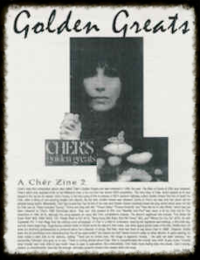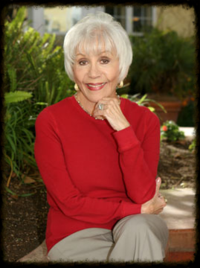 March, 2009
March, 2009
Los Angeles readers should know that Rona will be appearing for a DVD signing Wednesday, March 25 at 7:30 p.m. at the Barnes & Noble located at The Grove in the Farmers Market (Fairfax & Third).
Cher Scholar: From all your amazing interviews from the 1970s alone, how were you able to narrow down this DVD, Rona Barrett’s Hollywood: Nothing But the Truth, to ten iconic stars and why did Cher make the list?
Rona: Cher made the list because from the very first moment I met her I knew there was something special, unique and very different from some of the stars I had met in the late 50s and 60s. Actually, my first special was only going to be about the top young actresses in the business at the time. It was Cher’s PR person, the late Dick Grant, who came to me one day and said, “You want hot…let me give you hot! Cher’s the hottest woman star in all areas except the movies. You should include her on your first special.” I knew he was right and so Cher became the 4th woman on this breakthrough special back in 1974. I have always thought that Cher was my “good luck charm.” That special also included Ann-Margret, Liza Minelli and Raquel Welch and was the highest rated special of that time on daytime television.
CS: It appears the Cher interview took place in Sonny & Cher’s house in Bel Air (Cher Scholar’s favorite Cher house), in Cher’s bedroom which was featured on the last Sonny & Cher album and in Architectural Digest. Do you remember much about the rest of that fabulous house?
(Note: Cher fans know Cher has a long history of conducting magazine and TV interviews from her bedroom.)
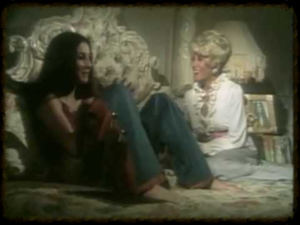
Rona: This was a grand house that had housed many famous stars. The house was first bought by Jayne Mansfield and had that big heart-shaped swimming pool. Tony Curtis also lived in the house. The rooms were very grand and spacious and Cher showed she had very good taste. She worked with a decorator [Ron Wilson] and the décor fit perfectly into this mansion.
CS: Were other family members around during the interview?
Rona: It was just Cher, the crew and my producer. These interviews were always meant to be intimate conversations, discussing what the difference between the “reel” and the “real” person we saw on the screen or on stage. Cher had no objection to using her bedroom and doing the interview on the bed. And so we did!
CS: One jaw-dropping moment of the interview came when Cher admitted she felt she was the “minutest part of Sonny & Cher.” Minute being such an interesting word choice. At that time Cher seemed to be going through many personal transformations in her self-view, learning that she was smarter than she thought she was and able to handle show business life on her own. Did you notice any other clues to personal and professional changes she was going through?
Rona: I felt she was on a new path to discovery and was just beginning to learn about herself and who she was. She had no one to really lean on any longer once Sonny was out of her life. I think I was right. I think her marriage to Greg Allman taught her that marriage to someone also in show business is not easy. I also think she learned a lesson about who does control your life. She needed to grow on her own – even though divorce is painful for most, whether they no longer love someone or still do.
I always wanted to know what really made a person tick. What was the background or the foundation of a person’s life? What did they learn?, what were they taught?, etc., etc.
CS: In modern interviews Cher is blunt and honest, but also guarded. It’s amazing how much she lets herself be vulnerable in your interview with her: she squeals with love for Gregg Allman, she seems bubbly and ecstatic. I also found Carol Burnett’s stories about her mother and father even more dramatic and personal than what I remember reading in her own autobiography.
Rona: I thought Carol’s interview was the most revealing. I loved her honesty and openness. I always thought that when a famous person can talk about a problem that exists in many people’s lives it helps the viewer realize they are not alone and that even difficult things happen to famous people.
CS: We’ve seen “coffee klatch” style interviews from other famous interviewers but those interviewers don’t seem to be able to elicit such personal honesty in casual conversation. Is it a trade secret how you accomplished that level of intimate conversation in these interviews? Does it having anything to do with how you describe yourself in your book as having “big shoulders?”
Rona: For me, it’s always been about learning something new for myself and helping others learn about themselves. I’ve never asked a question I would be afraid to answer myself. I listen a lot – probably because I wanted to be liked so much by the kids in the neighborhood that when they spoke to me I would listen very intently. Everyone likes to be listened to.
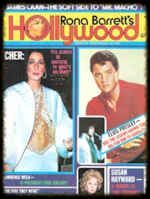 CS: Of course, I’ve collected plenty of Rona Barrett magazines over the years with Cher on the cover. Between 1972 and 1977, she in on practically every page. Why do you think she was the 70s phenomenon she was?
CS: Of course, I’ve collected plenty of Rona Barrett magazines over the years with Cher on the cover. Between 1972 and 1977, she in on practically every page. Why do you think she was the 70s phenomenon she was?
Rona: For all the reasons I have described above. The clothes and costumes she wore always made a statement and it was a statement about a young woman who wanted to be different from all the rest and she has become that person.
CS: How would you describe Cher’s character in contrast to other stars? Do you have any theories about why she’s stayed popular for this long?
Rona: She’s a person who always re-invents herself and each time she does, she becomes more interesting – you have to admire that quality. She, like so many, has become a survivor and proves you can be a survivor no matter how many ups and down you may go through. Just never give up!
CS: How was the magazine Rona Barrett’s Hollywood different from Rona Barrett’s Gossip?
Rona: I don’t think there was an overwhelming difference. I think people were always looking for my truthful details about a celebrity’s life. Being a real person who covered the entertainment industry made them feel I must know the truth. Both magazines had a sassy wit. Two of my editors were really very sharp and had a feel for what the Baby Boomer Generation really was looking for.
CS: In your DVD interview with Raquel Welch, she seems to voice many of the same complaints we hear today from Paris Hilton, at least in terms of feeling more famous for her looks and being painfully misunderstood. Do you see young stars handling gossip any better or worse these days?
Rona: I think the young stars today do not get the best advice. There were many stars during my era who did not do good things. They had similar problems to today’s stars, but at that time we did not have dozens of TV programs devoted to stars and their doings – there is a lot more space to fill. There was also a little bit left of the contract players studio system, which had at times the ability to lock out stories from the press.
I think women as beautiful as Raquel Welch will always have a difficult time unless they are able to find a role in which they show the real talent they have. It was only when Raquel went to Broadway did people begin looking at her differently. I do not see a Paris Hilton doing that sort of turn-a-round. And the longer she plays the nightclub scene or dressing up for some event, she doesn’t show that she really has overwhelming talent like a Meryl Streep or a Charlize Theron or a Kim Basinger. Charlize and Kim were always thought of as beautiful stars, but they went in hunt of good scripts, interesting characters – and played them where you no longer just looked at the beauty of these women, but could see and feel something that was much deeper inside of them. So the press soon had something else to use in their references to these stars – not just the image of being just an 8×10 glossy.
CS: Working with Eddie Fisher and Steve Lawrence you saw the fan side of the star/fan relationship. Working as a gossip columnist, you saw the celebrity side. Celebrities sometimes seem to feel a great deal of stress in their relationships with fans. On one level, they do want to impress somebody or some group, but that group of people never seems to be where their pool of fans come from. In a way, fans often come out of left field and sometimes they dig you for reasons you don’t expect. And there seems to be some discomfort there. What kinds of challenges do fans pose for celebrities other than security and privacy intrusions we see all too often?
Rona: When a person becomes famous their life changes and time becomes one of his/her biggest enemies. They do not know how to balance their time and therefore having a relationship with a fan is not likely – especially when fans think they own a piece of you. Mass fan mentality can cause accidents, problems, and death. At one time signing an autograph was all a fan wanted. Most stars who came out of the studio system knew how to handle the situation and were always surrounded when in public by people who knew how to politely get someone away from the star. That is not necessarily the case today. Photographers, now called Paparazzi, will do just about anything to get a photo that will make them hundreds of thousands of dollars. Money changes people and it has changed the world of how people now cover entertainment. There is also another problem and that is with having so many 24 hour cable shows on the air wanting to cover celebrity news and other stories, there is no time to really check facts to make sure what you are writing or saying is something accurate. Therefore, sometimes news is manufactured, not only in broadcasting but on the Internet. Tough to fight the Internet.
CS: You did however ask very bold questions yourself, candid questions about sex and marriage. (I love your question “what did you think marriage would be?”), and also blunt questions about the dark side of show business. How did celebrities and your audiences feel about those conversations?
Rona: The questions I asked at that time were, I believe, the first time any reporter asked those kinds of questions. I believe the public was interested in the answers to those questions.
CS: One dollar of every Rona Barrett’s Hollywood: Nothing But the Truth DVD sold will be donated to your Foundation for the Elderly Poor. What are the most important senior care issues facing our community today? And are there any current national policy issues you feel strongly about supporting?
Rona: The reason I agreed to do this DVD is because Infinity Entertainment Group agreed to pay $1 from every DVD to my Rona Barrett Foundation for the Elderly Poor. This has been my ‘love’ project for nine years. I began the Foundation after taking care of my father for 10 years after my mother died, and then helping to care for other friends whom I have referred to as “my angels on earth” because of the help they gave me during my career – in keeping me going when I often thought of quitting.
I feel very strongly about a lot of issues. We have so many crises going on this country it is hard to focus in on just one thing. I think it’s a crime to forget those people in this society who contributed in small and big ways to making this country what it is. For example, in the Santa Barbara tri-counties area there are more than 5,000 people over the age of 75 who are living only on their Social Security (SSI.) People on SSI cannot afford any kind of assisted living care. More than likely they have to get a doctor call their condition serious requiring skilled nursing care. They will more than likely be shipped to a different area where there may be a Medical bed. However, after 90 days MediCal will no longer pay for that care and these people are then dismissed. We need more day care centers for the elderly and more low income housing for these people – and different ways in which we can learn how to care for those who can no longer do it for themselves.
That’s the message I want to send and I hope some of Cher’s fans will go to our website and offer suggestions or donations at www.ronabarrettfoundation.org.
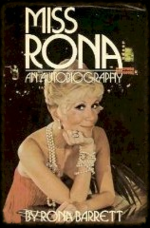 CS: Miss Rona was an inspiring story about self-discovery and overcoming physical and emotional handicaps. I’m looking forward to reading How You Can Look Rich and Achieve Sexual Ecstasy. Do you have any plans for more books?
CS: Miss Rona was an inspiring story about self-discovery and overcoming physical and emotional handicaps. I’m looking forward to reading How You Can Look Rich and Achieve Sexual Ecstasy. Do you have any plans for more books?
Rona: Yes I have a few more ideas for books and I hope to have one completed in the not too distant future.
CS: You didn’t talk much about him, but I loved the final story in Miss Rona about your dog, Lordie, and how he would bite both deliverymen and famous people. I thought, how refreshingly non-prejudicial! Do you have a picture of him you could share with us?
Rona: He didn’t bite people, but he would jump up and not allow anyone to get near me. I will look for a photo of Lord. He was a most wonderful animal and every time I see a large dog I’m always thinking of “Lord.”
CS: Rona, I had a great time putting these questions together. Thank you very much for taking the time to speak with me and Cher’s fans!
Rona: I thank you for the interesting morning I have just spent attempting to answer these questions.
For more information
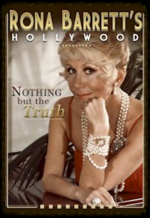 — Buy the DVD: Rona Barrett’s Hollywood: Nothing But the Truth
— Buy the DVD: Rona Barrett’s Hollywood: Nothing But the Truth
— Read Cher Scholar’s review of the DVD and inside clips of Cher in the magazine Rona Barrett’s Hollywood
